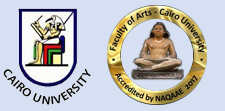عنوان المقال عربي
مظاهر التناص الديني في مسرحية "يُوسُف ومنوفيس" لـ ناظم حکمت دراسة وصفية تحليلية
Document Type
Review
Keywords English
التناصّ الديني, حکمت, يُوسُف
كلمات مفتاحية عربي
التناصّ الديني, حکمت, يُوسُف
Abstract English
Abstract: It is self-evident that literary texts overlap and embrace each other, for every new literary text is not weaved in it from a vacuum, rather there must be a relationship between it and the absent text, even if it is represented by different ratios determined by the degrees of influence and interaction between them, which is what is based on the concept of intertextuality in its various forms and degrees. Based on this concept, this study is based on tracing the phenomenon of religious intertextuality of "Nazım Hikmet" through his play "Yusuf and Menofis". It is no secret to a literary researcher that Hikmet is one of the most prominent Turkish writers who were inspired by the human heritage in their literature, in an attempt to address his ideological based ideology. On social thought and the glorification of human affairs, which is the role primarily assigned to religious text The goal of the religious text is to uphold the word of truth, maximize the status of the human being, and spread the lofty values, so it was necessary for a religious to intertwine in his works, whether this intertwining is complete as it appears in the intertextual intertextuality, or as referring by its displacement of functions and preserving their connotations, or The most creative intertextuality is the suggestive or the one known as the suggestive, and this is because the religious text in its nature provides the creator with open connotations of his thought and wide possibilities for expression.
الملخص العربي
من البديهي أن تتداخل النصوص الأدبية وتتعانق فيما بينها، فکل نصّ أدبي جديد لا تتم عملية النسج فيه من فراغ، بل لابد من وجود علاقة بينه وبين النصّ الغائب وإن مثّلها نسب مختلفة يحددها درجات التأثير والتفاعل بينهما، وهو ما بُني عليه مفهوم التناصّ بأشکاله المختلفة ودرجاته المتفاوتة. وإنطلاقا من هذا المفهوم، تقوم هذه الدراسة علي تتبع ظاهرة التناصّ الديني عند "ناظم حکمت" من خلال مسرحيته "يُوسُف ومنوفيس"، فلا يخفى علي باحث أدبي أن حکمت من أبرز الأدباء الأتراک الذي استلهموا التراث الإنساني في آدابهم، في محاولة لمعالجة أيديولوجيته الفکرية المرتکزة علي الفکر الإشترکي وتعظيم الشأن الإنساني، وهو الدور المنوط به بالأساس النص الديني؛ فهدف النص الديني هو إعلاء کلمة الحق، وتعظيم مکانة الإنسان، ونشر القيم السامية، لذا کان من الضروري أن يتناصّ "حکمت" دينيًا في أعماله، سواء أکان هذا التناص تامًا مقتبسًا کما يبدو في التناص الاقتباسي، أو إحاليًا بازاحته للدوال والإبقاء علي دلالاتها، أو التناصّ الأکثر إبداعًا وهو الايحائي أوالذي يعرف بالتملحي، وهذا لان النص الديني في طبيعته يقدم للمبدع دلالات منفتحة علي فکره وإمکانات رحبة في التعبير.
Recommended Citation
Mohamed, Mohamed
(2022)
"The manifestations of religious intertextuality in the play "Youssef and Menoufis" by the Turkish writer Nazim Hikmet
An analytical descriptive study,"
Journal of the Faculty of Arts (JFA): Vol. 82:
Iss.
2, Article 25.
DOI: https://doi.org/10.21608/jarts.2021.71395.1131
Digital Object Identifier (DOI)
10.21608/jarts.2021.71395.1131
Accept Date
2021-07-08
Publication Date
4-1-2022

